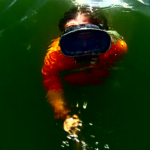Three Duluth Stories
 I moved to Duluth in March of 1998. It was during the El Nino winter, in which every single human with whom I interacted informed me that this winter was NOT NORMAL FOR MINNESOTA. It came up in every conversation, which, over the course of the six months that normally would comprise one Duluth winter, provided a more vigorous facsimile of the suspended, punishing experience; only instead of shivering from the cold, I was shivering from collective dread, carefully cultivated by the city’s entire populace. In the wake of such calamitous portent, simple freezing fucking winter was actually a relief. Thus it was that I spent an entire terrifically warm winter in Duluth scared shitless, forming alliances and hoarding dry goods, waiting for real winter to come, like Duluth was some kind of folksy, sitcom version of Game of Thrones.
I moved to Duluth in March of 1998. It was during the El Nino winter, in which every single human with whom I interacted informed me that this winter was NOT NORMAL FOR MINNESOTA. It came up in every conversation, which, over the course of the six months that normally would comprise one Duluth winter, provided a more vigorous facsimile of the suspended, punishing experience; only instead of shivering from the cold, I was shivering from collective dread, carefully cultivated by the city’s entire populace. In the wake of such calamitous portent, simple freezing fucking winter was actually a relief. Thus it was that I spent an entire terrifically warm winter in Duluth scared shitless, forming alliances and hoarding dry goods, waiting for real winter to come, like Duluth was some kind of folksy, sitcom version of Game of Thrones.
In fairness, Duluth is a really strange place. It was going to be strange, whether or not the winter was briefly co-opted by an exotic air current. I have a hundred examples of Duluth’s magnificent wackiness, but that’s too many for today. So here are three.
I. My First Job in Duluth
I moved to Duluth from a short stay in Minneapolis where vacancy was so low, I couldn’t find an apartment for me and my 2 ½-year-old son, let alone afford one. My sister suggested we look at Duluth, where she was going to school, so I did. I found a $350-a-month apartment literally around the corner from hers. It was a two-bedroom within walking distance of town, stores, and most importantly, the House of Donuts and Tacos. I forked over all of my savings and moved with my son to Duluth.
I loved everything about my new digs. My son and I really were just starting out, and our furniture was largely innovated: a moving box covered by an artfully draped quilt was a nightstand, pilfered milk crates affixed with GB ties were shelves, and an approximately 500-pound coffee table, recovered from the alcove of my sister’s apartment, filled the space. My kitchen table was held together with GB ties (they are really handy) and duct tape, so everyone sat down gently, like we were at church, to prevent Richter events upending the coffee.
I got a gigantic box of a TV (it was 1998) from a friend of a friend, and somehow the picture-making portions of the machine (tubes, wires, mice with tiny hammers and Bjork’s cities of electrons) were damaged, resulting in an uncorrectable darkness in the display. While this made it hard to see any scenes shot in the dark (see you later, sex scenes), it did make it possible for me to watch Scream with my horror-fan sister, because all of the murder bits were blacked out by my puritanical television. It was kind of a radio/TV hybrid experience.
One weekend morning, just a few weeks after we moved in, my son and I were lazily enjoying the bright parts of Aladdin when what sounded like a flash mob in combat boots stomped up the stairs to my neighbors’ apartment. The mobbers pounded on the door and announced they were, in fact, not dancers but police, who would appreciate the door being opened immediately. I hopped up and cracked my door open. The entire hallway, the stairs, and assumedly the upstairs landing were filled with police in SWAT gear, weapons drawn, hunkered down in what I like to think of as the “squatty-shooty” position. One officer glared at me. “REMAIN IN YOUR APARTMENT, MA’AM.” My eyes darted back and forth between his face and his gun.
“Yeeaah?” I said, skeptically.
“MA’AM, PLEASE REMAIN IN YOUR APARTMENT.” I nodded, gently closed the door, and looked at my son, who was, no less than fifteen feet away, intently watching Aladdin, apparently unvexed by the sudden introduction of possible uberviolence in the stairwell.
I felt certain the apartment, delightful and cozy as it was, was not bulletproof. “Let’s go get breakfast with bacon!” I said to my son, clicking the TV off as the police shouting changed from entreaties to open the door to plans for sudden and vehement renovation of the entryway. Our winter boots were in the SWAT-populated hall, so we wore our sneakers out the back door, down the snow-covered stairs, through the foot-deep snow in the neighbor’s back yard, and down to Uncle Loui’s Café. I wasn’t sure how long a sting-operation would take, so we stayed for a long time, during which I had the chance to really get to know our server. She explained that this neighborhood was a little touch and go, but generally good. She said my neighbors must have really done something terrible for that kind of police response. The only thing out of the ordinary I’d noted had been a weeklong dance party, which started around 8 p.m. and extended into the wee hours of the morning, and was, according to my deductive skills, attended exclusively by very heavy people in high heels with a demonstrably deep appreciation for Def Leppard’s 1980’s work. My son and I are heavy sleepers, so this was really more curious than troublesome. And certainly no clue as to what kind of nefariousness might incite this ire-storm from local law enforcement. I explained all of this to our server, while consuming a molecule-vibrating volume of coffee.
On the way in to the restaurant, I had noticed a help-wanted sign in the window. As I chatted with the server, I decided to ask for an application. I filled it out while my son colored and ate bacon. And that’s how I got my first job in Duluth.
II. Perspicuity
In 2003, I drank a record-breaking quantity of alcohol on New Year’s Eve. Not a shoulda-died quantity of alcohol, but definitely a how-did-you-get-this-far-without-puking-let’s-start-right-now amount of alcohol. I woke up, so hungover I could scarcely function. Walking made me dizzy. Food was not an option, since even water smelled and sounded like a glass of melted cheese to my tortured stomach, which had spent the previous six hours negotiating with my delirious cerebellum about whether we should spin, sleep, puke, or all three. (All three!)
Up until that morning, I had always wondered about the rustic but inscrutable aphorism, “I didn’t know whether to shit or go blind,” but it made gruesome sense to me as I attempted to put my sock on a foot that was comically far away from my bloodless hands. I finally just jammed my hammy foot parts into my winter boots, and prepared to walk up the hill to my mother’s apartment, where I’d left my car.
My mother loves me so much. She loves me so much she made me leave my car at her apartment after I had consumed one single Molson, pre-gaming my New Year’s Eve plans. She loves me so much she bought me the most wintry winter parka in the history of winter parkas. She bought me a human duvet cover, with an eyehole like a fur-lined periscope through which I could see the Duluth landscape, five inches at a time.
I began the uphill trudge fully ensconced in this supreme parka, stopping every 25 yards or so to literally rest my hands on my thighs, hang my head, and recover from the screaming exhaustion of every cell in my body. About two-thirds of the way up the endless fucking hill, I noticed another figure walking down. He was also enparka-ed, swallowed up by a gigantic down pouch, his face obscured but for the narrow opening left for his eyes. We probably looked, from a distance, like two human versions of South Park’s Kenny, slouching toward one another in the real. We walked slowly, painfully toward one another, and over that approximately fifty yards, I realized he was suffering as mightily as I, and I believe he had a similar epiphany. He was on one side of the street, and I was on the other. When we were within shouting distance of one another, I instinctively crossed the road, ambling slowly toward him. He did the same. We met in the middle of the street, and simultaneously unfastened our parka hoods, opening the parka portholes to allow our faces into the winter air. And then, without discussion or explanation, we kissed, like it was what we were both walking all this way to do.
Neither of us said a thing. We resecured our hoods, and simply walked away, each in our separate directions.
III. As Happy Does
There used to be a guy in Duluth who walked around my neighborhood a lot. I believe he had some form of disability, although I hesitate to call him disabled, since he was always so happy and contented when I saw him, it made me question what “ability” really meant in the context of sustained human happiness. He carried two things with him on his recurrent perambulations: an old, leather-clad suitcase and an AM/FM radio on which some country station perpetually played Merle Haggard and Loretta Lynn songs. The man walked along at a ruminative pace, engrossed in the passing scenery and animatedly, gleefully singing along with whatever song was playing. Whenever I drove by him, he was almost always smiling ear to ear.
About five years ago, I was driving home from Two Harbors in my old Volvo. The odometer on that beloved car had quit at 298,000 miles (I imagine it quit with an audible sigh, like when I take off a pair of cruel shoes or sit down after standing on a cement floor for too long) about a year before, so it’s safe to say the car was really closing out its time as a viable mode of transportation. Most of the windows no longer worked, the gas gage was possessed, and the engine head was cracked. Slowly but surely, the car was dying, and I knew that all it would take was whatever the automotive equivalent of pneumonia was, and that would be that.
Driving home from Two Harbors, I kept hearing someone honking their horn behind me. I craned my neck and scanned the horizon for people I might have offended, but there was no one close enough. I concluded that someone was honking at someone else. A few minutes later, I started to realize the honking was coming from my car, a sort of tepid version of the realization Drew Barrymore has in the movie Scream, when she figures out the murderer’s calls are coming from inside the house.
I pulled over, rolled down the window, and enjoyed a righteous festival of beeps from my car’s horn. By way of investigation, I turned off and restarted the car, lifted the hood (why?), honked the horn manually a few times, and generally concluded that the horn was making its own honking decisions now. This still left the matter of getting the car home, so I set out with the idea that I would apologetically smile at people as I passed, shrugging guilelessly at them to indicate my innocence in the fervent beepstorm that was my passing.
It turns out that when you’re behind someone at a stop sign, beeping like you are pounding your horn with both fists, people will not notice your guileless shrugs. It also turns out that there is no universally-recognized hand gesture for, “my horn is BROKEN!” Try right now to do one. If you’re like me (and I know you are) you’ll point to your horn and then raise your hands to make a breaking gesture, followed immediately by the splayed fingers and raised palms of surrender. From the perspective of the beep-ee in front of you, you are gesturing threateningly while beeping furiously. According to my research, this makes other people very angry. I got flipped off at least five times as I drove home — a few people actually pulled over to let me by and flip me off. I finally abandoned my attempts to make any explanation as I honked my way home.
As I crested the hill of my home’s avenue, I saw him: the happy walker. There was nothing I could do. As I passed, he was clearly startled and frightened by the unwarranted aggression of horn frenzy, and sort of staggered backward onto the berm next to the sidewalk, sitting down on the grass with his radio in one hand and his suitcase in the other. I did the only thing I could think to do: I plastered a gigantic, loony smile on my face and waved maniacally at him. Slowly, his face lit, and he smiled back, raising one hand in a kind of shocked, pageant wave as I rounded the corner, parked the car, and turned it off, forever.
Recommended Links:
Leave a Comment
Only registered members can post a comment , Login / Register Here














No Comments